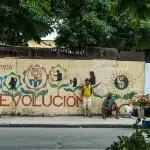
By Medea Benjamin and Nicolas J. S. Davies – Oct 28, 2020
Less than a year after the United States and the U.S.-backed Organization of American States (OAS) supported a violent military coup to overthrow the government of Bolivia, the Bolivian people have reelected the Movement for Socialism (MAS) and restored it to power.
In the long history of U.S.-backed “regime changes” in countries around the world, rarely have a people and a country so firmly and democratically repudiated U.S. efforts to dictate how they will be governed. Post-coup interim president Jeanine Añez has reportedly requested 350 U.S. visas for herself and others who may face prosecution in Bolivia for their roles in the coup.
The narrative of a rigged election in 2019 that the U.S. and the OAS peddled to support the coup in Bolivia has been thoroughly debunked. MAS’s support is mainly from indigenous Bolivians in the countryside, so it takes longer for their ballots to be collected and counted than those of the better-off city dwellers who support MAS’s right-wing, neoliberal opponents.
As the votes come in from rural areas, there is a swing to MAS in the vote count. By pretending that this predictable and normal pattern in Bolivia’s election results was evidence of election fraud in 2019, the OAS bears responsibility for unleashing a wave of violence against indigenous MAS supporters that, in the end, has only delegitimized the OAS itself.
It is instructive that the failed U.S.-backed coup in Bolivia has led to a more democratic outcome than U.S. regime change operations that succeeded in removing a government from power. Domestic debates over U.S. foreign policy routinely presume that the U.S. has the right, or even an obligation, to deploy an arsenal of military, economic and political weapons to force political change in countries that resist its imperial dictates.

No matter which instrument of regime change the U.S. has deployed, these U.S. interventions have not made life better for the people of any of those countries, nor countless others in the past. William Blum’s brilliant 1995 book, Killing Hope: U.S. Military and CIA Interventions Since World War II, catalogues 55 U.S. regime change operations in 50 years between 1945 and 1995. As Blum’s detailed accounts make clear, most of these operations involved U.S. efforts to remove popularly elected governments from power, as in Bolivia, and often replaced them with U.S.-backed dictatorships: like the Shah of Iran; Mobutu in the Congo; Suharto in Indonesia; and General Pinochet in Chile.
Even when the targeted government is a violent, repressive one, U.S. intervention usually leads to even greater violence. Nineteen years after removing the Taliban government in Afghanistan, the United States has dropped 80,000 bombs and missiles on Afghan fighters and civilians, conducted tens of thousands of “kill or capture” night raids, and the war has killed hundreds of thousands of Afghans.
Even when the targeted government is a violent, repressive one, U.S. intervention usually leads to even greater violence. Nineteen years after removing the Taliban government in Afghanistan, the United States has dropped 80,000 bombs and missiles on Afghan fighters and civilians, conducted tens of thousands of “kill or capture” night raids, and the war has killed hundreds of thousands of Afghans.
In Libya, it has been nine years since the U.S. and its NATO and Arab monarchist allies launched a proxy war backed by a covert invasion and NATO bombing campaign that led to the horrific sodomy and assassination of Libya’s long time anti-colonial leader, Muammar Gaddafi. That plunged Libya into chaos and civil war between the various proxy forces that the U.S. and its allies armed, trained and worked with to overthrow Gaddafi.

Duss wants an independent commission to judge these two decades of war based on “the standards of international humanitarian law that the United States helped to establish after World War II,” which are spelled out in the UN Charter and the Geneva Conventions. He hopes that this review will “stimulate vigorous public debate about the conditions and legal authorities under which the United States uses military violence.”
Such a review is overdue and badly needed, but it must confront the reality that, from its very beginning, the “War on Terror” was designed to provide cover for a massive escalation of U.S. “regime change” operations against a diverse range of countries, most of which were governed by secular governments that had nothing to do with the rise of Al Qaeda or the crimes of September 11th.
Notes taken by senior policy official Stephen Cambone from a meeting in the still damaged and smoking Pentagon on the afternoon of September 11, 2001 summarized Secretary of Defense Rumsfeld’s ordersto get “…best info fast. Judge whether good enough hit S.H. [Saddam Hussein] at same time—not only UBL [Osama Bin Laden]… Go massive. Sweep it all up. Things related and not.”
At the cost of horrific military violence and mass casualties, the resulting global reign of terror has installed quasi-governments in countries around the world that have proved more corrupt, less legitimate and less able to protect their territory and their people than the governments that U.S. actions removed. Instead of consolidating and expanding U.S. imperial power as intended, these illegal and destructive uses of military, diplomatic and financial coercion have had the opposite effect, leaving the U.S. ever more isolated and impotent in an evolving multipolar world.

But the United States has gradually deteriorated through the Cold War and post-Cold War triumphalism to a flailing, decadent empire that now threatens the world with a doctrine of “might makes right” and “my way or the highway.”
When Barack Obama was elected in 2008, much of the world still saw Bush, Cheney and the “War on Terror” as exceptional, rather than a new normal in American policy. Obama won the Nobel Peace Prize based on a few speeches and the world’s desperate hopes for a “peace president.” But eight years of Obama, Biden, Terror Tuesdays and Kill Lists followed by four years of Trump, Pence, children in cages and the New Cold War with China have confirmed the world’s worst fears that the dark side of American imperialism seen under Bush and Cheney was no aberration.

Bolivia’s triumph over U.S.-backed regime change is an affirmation of the emerging people-power of our new multipolar world, and the struggle to move the U.S. to a post-imperial future is in the interest of the American people as well. As the late Venezuela leader Hugo Chavez once told a visiting U.S. delegation, “If we work together with oppressed people inside the United States to overcome the empire, we will not only be liberating ourselves, but also the people of Martin Luther King.”
Featured image: Bolivian woman votes in October 18 election. [Source: elcomercio.pe]

Medea Benjamin
Medea Benjamin is the co-founder of the peace group CODEPINK and the human right organization Global Exchange. Follow her on twitter at @MedeaBenjamin.
- Medea Benjamin#molongui-disabled-linkJune 21, 2023
- Medea Benjamin#molongui-disabled-linkNovember 19, 2021
- Medea Benjamin#molongui-disabled-link

Nicolas Davies
Nicolas J S Davies is the author of Blood On Our Hands: the American Invasion and Destruction of Iraq and of the chapter on "Obama At War" in Grading the 44th President: A Report Card on Barack Obama's First Term as a Progressive Leader.
- Nicolas Davies#molongui-disabled-linkJune 21, 2023
- Nicolas Davies#molongui-disabled-link
- Nicolas Davies#molongui-disabled-linkNovember 22, 2020
- Nicolas Davies#molongui-disabled-linkJanuary 3, 2020
Tags: coup d'etat North Atlantic Treaty Organization (NATO) Organization of American States (OAS) regime change US foreign policy US Imperialism
Share this:
- Click to share on Twitter (Opens in new window)
- Click to share on Facebook (Opens in new window)
- Click to share on LinkedIn (Opens in new window)
- Click to share on WhatsApp (Opens in new window)
- Click to share on Reddit (Opens in new window)
- Click to share on Telegram (Opens in new window)
- Click to email a link to a friend (Opens in new window)






